Tuesday, November 29th, 2022
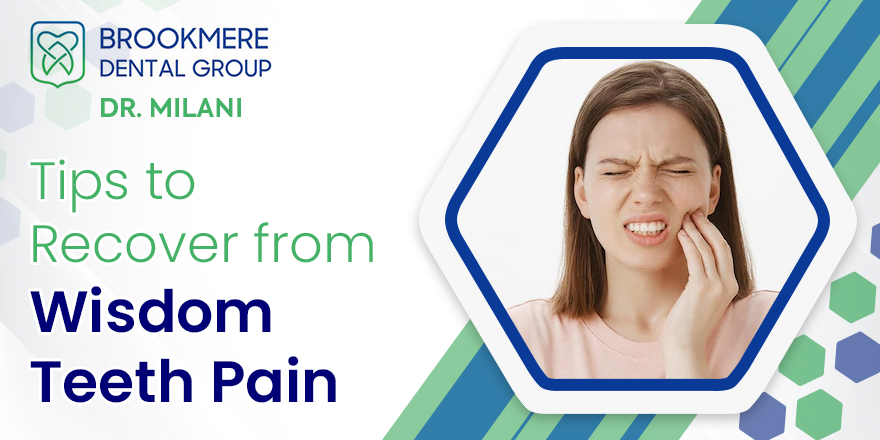
Wisdom Teeth. Sometimes when you least expect it, those pesky third molars start to emerge from the sides of your mouth. For many people, this can be a stressful and painful process, but don't worry! In this blog post, we'll cover some wisdom teeth pain recovery tips from our family Dentistry in Coquitlam.
If you're among the 70% of people in Canada who have wisdom teeth, you may be all too familiar with the pain and discomfort they can cause. While some people never experience any problems with their wisdom teeth and can keep them healthy with regular brushing and flossing, others may develop cavities, gum disease, or other problems that require treatment. Impacted wisdom teeth are especially prone to causing problems, as they can crowd or damage adjacent teeth.
Wisdom teeth are the third and final set of molars that most people get in their late teens or early twenties. They're called wisdom teeth because they come in at a time when you're old enough to (hopefully) have some wisdom.
While getting your wisdom teeth can be a painful experience, there are ways to minimize the discomfort and speed up the recovery process. Here are some tips on how to recover from wisdom teeth pain:
If you are looking for a Family Dentistry in Coquitlam, Brookmere Dental can help by providing dental services that can improve the health of your teeth and gums. We offer a wide range of dental services, including teeth whitening, braces, and oral surgery. We also provide emergency dental services for those who need immediate care. Our team of experienced Coquitlam dentist and dental hygienists are dedicated to providing you with the best possible care. We accept most insurance plans, and we offer financing options to make payment easy.
If you’re looking for a one-stop solution to your wisdom teeth pain in Coquitlam, look no further than Brookmere Dental Coquitlam dentist.
Our team of experienced dental professionals can help to assess your individual situation and recommend the best course of treatment. We offer a full range of wisdom teeth services, from extractions to implants, and we’ll work with you to ensure that you get the care you need.
Don’t let wisdom teeth pain hold you back – contact Brookmere Dental today to book an appointment.
There are a few preventative measures that can be taken to help reduce the pain associated with wisdom teeth. First, it is important to maintain good oral hygiene. This means brushing and flossing regularly, as well as using mouthwash. Secondly, it is important to eat a healthy diet and avoid sugary foods and drinks. Lastly, if you are experiencing pain, it is important to see a dentist or oral surgeon as soon as possible to determine if the wisdom teeth need to be removed.
Saturday, October 15th, 2022

Teeth whitening treatments are the ideal option for anyone who suffers from discoloured teeth. These treatments have gained wide popularity because they can brighten any smile without the need of undergoing any major dental procedures. If you are planning to undergo a whitening treatment, we would like to encourage you in considering professional tooth whitening.
Professional teeth whitening treatments can enhance the visuals of your smile in a customized manner so that all your teeth end up with the same level of brightness. You will also experience long-lasting results when you undergo professional tooth whitening and expose yourself to fewer chemicals than when using an over-the-counter whitening product.
Having said that, you should know that no matter what teeth whitening option you choose, the most important part of the procedure is aftercare when you can maintain the results by maintaining some dental habits and taking good care of your teeth.
Brushing and flossing your teeth every day is a crucial part of preventing staining on your teeth but also take care of your oral hygiene. It is highly important that you brush and floss your teeth two times a day with good toothpaste (a fluoride-based one is a better option). Each brushing cycle should take around two minutes and if you can sneak a third time to brush during the day, that’s always an added bonus. If that is not feasible, you can always brush and floss first thing in the morning and before you turn in for the day.
Did you know that a morning cup of coffee can do more harm than good when it comes to the colour of your teeth? Drinks such as coffee, red wine and sodas can reverse the effects of your teeth whitening. So do hard candies, tomato sauce and dark berries. It is quite understandable if you cannot completely remove these drinks and food items from your life, so to lessen their harmful effects comes the next two points.
No matter how many precautions you take, some food and drinks are bound to stain our teeth. One good way to minimize this harmful effect is to flush them down with water. Water can help in rinsing off the liquids before they get a chance to stain your teeth. Additionally, you will also be keeping your body hydrated.
Wondering how straw can help in keeping your teeth white? Well, if you are drinking coffee with a straw, it limits the contact between the drink and your teeth. That’s how you prevent your teeth from staining. If you are drinking something that you think might affect the colour of your teeth, use a straw, you won’t regret it.
You may already do this, but you can consider it as a gentle reminder just in case. Replacing your toothbrush every three months is important as the bristles of your brush can collect bacteria from the teeth. The bristles also wear out which means that they won’t be able to clean your teeth properly. If you have noticed this, then you already know that it’s time to change your toothbrush.
It’s no secret that smoking is bad for your body and overall health. It’s one of those habits you should try to avoid no matter what. When it comes to teeth whitening treatments, smoking can stain on your teeth on the surface. If you can’t quit smoking, a safer alternative can be vapour cigarettes. They allow you to get the nicotine your body is craving without the stains that come along with other ingredients.
These are only some of the practices that you should include in your regular oral routine to keep your sparkly whites, white. There are many more and your dentist can make you aware of them. If you are looking for teeth whitening in Coquitlam, you can book an appointment at Brookmere Dental Group. They are experts in this treatment. And for more topics like this, follow this blog.
Thursday, September 1st, 2022
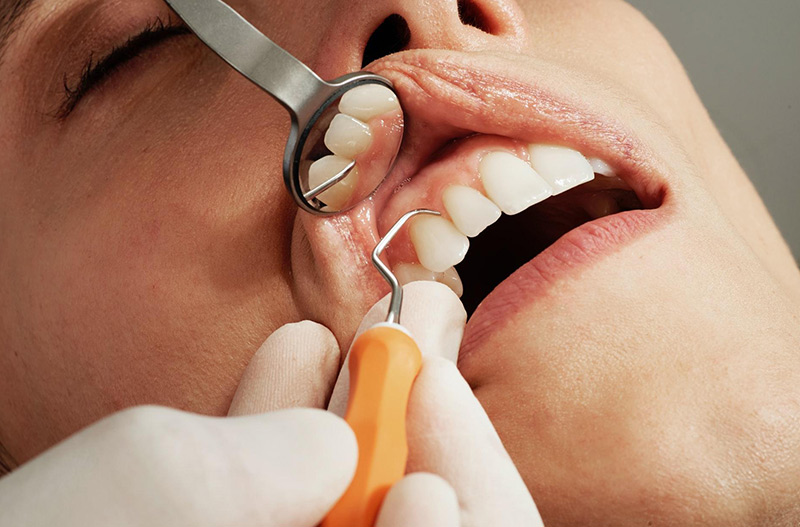
Exposed dentin is a health condition that is preventable and treatable. A visit with your dentist will diagnose the cause of tooth sensitivity. Preventative measures and treatment options restore and protect teeth from decay and exposed dentin.
Exposed dentin harms your overall sense of well-being because it’s an exposed barrier that protects the inner parts of your teeth. There is soft pulp with sensitive nerves inside your teeth. When your dentin is exposed, you may experience sensitivity or pain when your teeth come into contact with:
Instead of wondering how to treat the pain on your own, trust a professional to help remedy the pain and sensitivity in your mouth.
Certain harmful mouth hygiene practices and reactions to stress can cause exposed dentin. Some people use the wrong tools to clean their teeth, such as the wrong hardness of toothbrushes. Dentists can help with the most common causes of exposed dentin, including:
The wearing down of the teeth and decay from harmful bacteria contained in plaque dissolve the protective tooth enamel. A dentist will demonstrate and advise you on proper brushing and flossing techniques to avoid further exposure of the dentin.
Exposed dentin treatment is the most effective and safest with guidance from a dentist. There are several options for treating the affected exposed areas, eventually relieving the pain in your mouth. Exposed dentin treatment includes:
Proper dental treatment and hygiene protect teeth and gums from further decay and relieve pain. When you need a dentist in Coquitlam, trust the Brookmere Dental Group for comprehensive care. Book an appointment for exposed dentin and other oral health needs.
Monday, August 1st, 2022
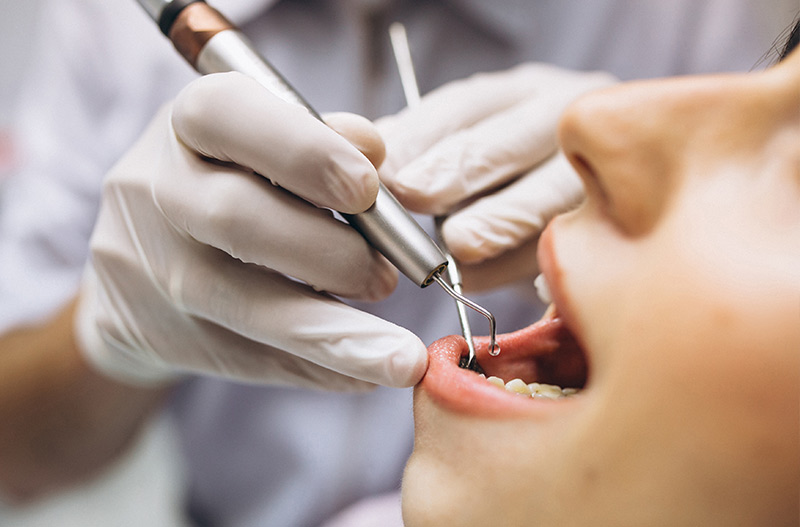
Many people like to drink sparkling water because they find it more appealing than regular water. Additionally, they get to enjoy a variety of fun flavors without the worry of high sugar intake. If you are a regular consumer of sparkling water and are concerned about your teeth, then you will want to know how it will affect your teeth, your gums and your overall health.
According to the most current research, sparkling water is generally fine for your teeth and gums. In one study, teeth that were removed for treatment were studied to see if sparkling water would attack the tooth enamel more aggressively than regular water. The findings demonstrated that sparkling water generally did not impact teeth and gums negatively. There is one caveat to this, however. Sparkling waters that are citrus flavored contain more acid than those that are not, and these can potentially impact your teeth and gums negatively because the acid content in citrus-flavored sparkling waters can erode the enamel on your teeth.
Sparkling water is much better for your health than sugar sweetened beverages. Sugary drinks have been known to cause a plethora of health problems, and therefore they are best consumed in moderation. If you are looking for a drink that contains flavor and are not in the mood to drink regular water, sparkling water is an outstanding choice because it is free from sugar and will not negatively impact your health.
Research shows that all carbonated water has a higher acid content than plain water. Some sparkling waters are more acidic than others depending on the ingredients that are used.
If you want to enjoy sparkling water, then you must follow the below tips for best results.
Pay attention to the ingredients in your sparkling water. Sparkling waters that are citrus based can erode your teeth if you consume them too much. If you are a huge fan of citrus flavors and want to consume citrus-flavored sparkling water, consume them with your meals so you have something else to offset the acid content and avoid the chances of eroding your teeth and experiencing emergency dental problems.
Sparkling waters that contain any amount of sugar can no longer be legitimately considered sparkling water. When sugar has been added to sparkling water, it is now considered a sweetened beverage which can impact your teeth and health. For best results, only consume sparkling waters that contain no amount of sugar.
If you consume sparkling water regularly, be sure to also drink plain water. Even though sparkling water will not impact your teeth, gums and health negatively, plain water is still always better.
If you want to make sure your teeth remain in tiptop shape, you must schedule a dental checkup with our leading dentist in Coquitlam. We will provide you with a thorough checkup and make recommendations for maintaining your oral health to prevent the development of serious problems. With us, you are in good hands as we believe in giving our patients superior-quality care and making them feel relaxed.
Friday, July 1st, 2022

Do you suffer from bad breath and chronic throat infections? You might be a member of the tonsillolith club! Tonsilloliths, commonly known as tonsil stones, are a common oral problem for adults.
Approximately 5% to 6% of people experience tonsil stones. But what are they, and are they dangerous to your health? Get the answers here and learn how your dentist in Coquitlam can help.
Tonsil stones are hard calcified deposits that form in the crevices of your tonsils. They're usually yellow or white and can range from microscopic bits to several centimeters in size. One of the biggest tonsil stones ever removed measured 3.1 × 2.3 cm (about the size of a grape!)
You might have tonsil stones if you notice some of these common symptoms:
Some people are asymptomatic, while others can clearly see the stones. Many people find out they suffer from tonsilloliths when they cough or sneeze too hard. The vibrations can dislodge the stone, causing it to fly out.
Tonsil stones are the result of food or debris getting trapped. The mucous membrane that covers your tonsils contains crevices where these bits tend to accumulate. Some people have deeper crevices, making it easier for tonsil stones to get stuck.
The most common causes of tonsil stones include:
Your family dentist always stresses the importance of proper oral care. But skipping the floss and not brushing well doesn't just affect your teeth and gums; it can lead to more tonsil stones!
Tonsil stones are not usually dangerous. They might be annoying and embarrassing, but they won't cause serious physical harm. The worst that can happen is that they become too large to be ignored.
But if your tonsil stones come with severe ear or throat pain, it's best to see a doctor. There might be an underlying reason that's irritating your tonsils. Your local dentist can also remove any large, bothersome tonsil stones.
If you've noticed a few tonsil stones and want to get rid of them, there are a few methods to try. You can attempt to remove them yourself or visit the best dentist in Coquitlam! But a mild case of tonsil stones is usually easy to treat using these tips:
If none of these methods work, seeking professional dental services is the next step. A recommended dentist can easily remove larger stones embedded deep in the tonsils.
Tonsil stones aren't dangerous, but this issue can lead to frustration and embarrassment. The best way to prevent bad breath and chronic throat infections is by practicing excellent oral hygiene! Need some help with that?
Visit Brookmere Dental Group, your friendly dentist in Coquitlam. We offer family, cosmetic, and emergency dentistry in a friendly environment. Schedule an appointment today, and we'll take care of those stones!
Wednesday, June 1st, 2022

In the late 1990s and early 2000s, it seemed that smoking was on the decline in Canada. British Columbia was no exception but unfortunately, this is a trend that now appears to be reversing. The latest figures show that at least 15% of the population here smokes.
There are many good reasons to visit a dentist in Coquitlam, but if you're a smoker then this is especially important to do on a regular basis. You're probably well aware of how smoking can affect your physical and mental health, but how does smoking affect your teeth?
That's what we're going to be discussing today. Read on to see if it might be time for you to schedule a dental check up in Coquitlam.
Let's start off with something on the less serious side of things. Smoking is renowned for causing discoloration in teeth.
Your teeth are made out of enamel and this enamel has microscopic cracks on its exterior. Every time you smoke a cigarette the nicotine and tar contained inside settle into these cracks.
Over time this is guaranteed to cause discoloration. Usually, you'll notice a yellow or brown color developing.
If you have discolored teeth from smoking you will eventually have to address the root cause of the issue by kicking the habit. But in the meantime, you can try a teeth whitening treatment.
If you're a smoker then you're automatically at risk of developing gum disease. This is because smokers have higher bacterial plaque production rates. Over time it's this plaque that can lead to gum disease, which often results in tooth loss.
What's worse is that because smoking restricts levels of oxygen in your bloodstream your infected gums have a harder time healing. It's for this same reason that smokers often have a more difficult time healing from dental surgeries and treatments.
Of course, one of the more serious consequences of smoking is an increased risk of developing several different types of cancers. This includes oral cancer.
Did you know that smokers are 10 times more likely to develop oral cancer than non-smokers? While dentists don't directly treat oral cancer, they are able to spot signs of it and are integral in relaying different treatment options to you and coordinating with other medical professionals.
Nobody likes that one person who always has bad breath—you definitely don't want to be that person either. But it's a fact that smokers are prone to chronic cases of halitosis. It's a condition called smoker's breath, and short of giving up smoking entirely, it can be very difficult to treat.
Everyone should visit their dentist on a regular basis, but if you're a smoker you should take extra special care of your oral health. If you'd like to visit a dentist in Coquitlam, we'd be happy to see you. Get in touch to book your appointment at your earliest convenience.
Sunday, May 1st, 2022
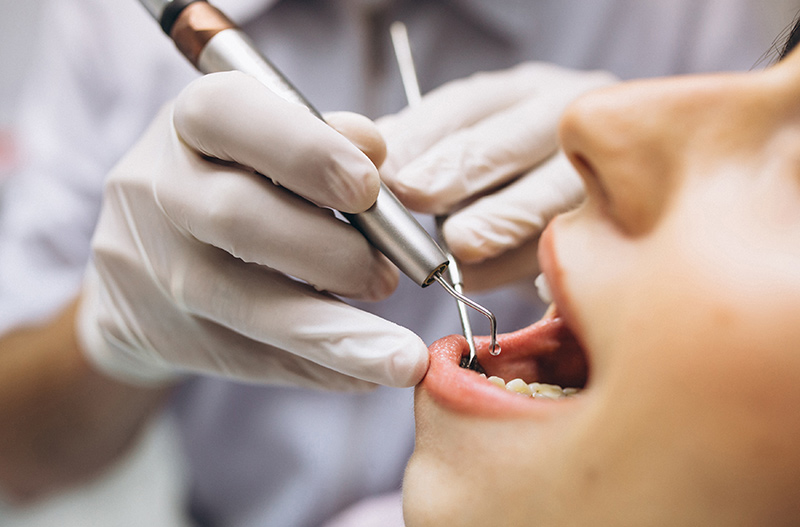
Oral hygiene is one of those areas that most people find easy to neglect. However, a little effort up front goes a long way toward preventing cavities, gum disease, and other issues that are, unfortunately, quite common. As you review the list below, don't hesitate to get proactive and start implementing preventive solutions as soon as possible.
Sensitive teeth can be painful, and they can also end up having a significant impact on which foods you are able to eat. If you've noticed that your teeth have become sensitive to sugary foods, then it's time to put away the candy and get more disciplined with your diet. Drinking icy water, hot coffee, or hot tea can also trigger sensitive teeth.
While sensitive teeth can be a symptom of many underlying conditions, gum issues are among the most common causes. Brushing your teeth too aggressively can cause gums to recede, but so can normal aging. If you've already eliminated bothersome foods and checked your brushing habits, then the next step may be to come in for a checkup.
Buildup of tartar and plaque on the gums can cause gingivitis, and gingivitis can lead to painful inflammation. When gingivitis progresses without treatment, it can turn into a serious condition known as periodontitis. Fortunately, it's easy to catch gingivitis early.
Common symptoms include discoloration around the gum line or swollen and sensitive gums. In addition to brushing your teeth once in the morning and once in the evening, flossing regularly also provides a solid defense against gingivitis.
When many people think of dental problems, cavities are what immediately come to mind. However, it's more accurate to think of tooth decay as a process. If decay is able to set in and start damaging a tooth's enamel, then eventually it will eventually begin damaging that tooth's root unless treated. Like gum disease, tooth decay isn't difficult to prevent. Brushing, flossing, and scheduling regular dental appointments can certainly help you avoid pesky cavities and stay away from costly dental surgery.
Most often, an infected root is the result of untreated tooth decay. As suggested by its painful nature, a root infection is an emergency situation. As the infection progresses, you may notice swelling in your checks, sore gums, pain in your jaw, and even swelling of the lymph nodes. The best way to prevent a root infection is to follow our advice for preventing cavities and gum disease.
This is the only common problem on this list that isn't necessarily due to poor dental hygiene. Through no fault of your own, an unfortunate accident can result in missing teeth. Regardless of the cause, however, it's important to replace a missing tooth as soon as possible. Fortunately, we offer dental implant services that can help.
The problems listed above are all preventable or treatable if you take the time to monitor your oral health and form proper habits. To book an appointment with a Coquitlam dentist, contact us today.
Friday, April 1st, 2022
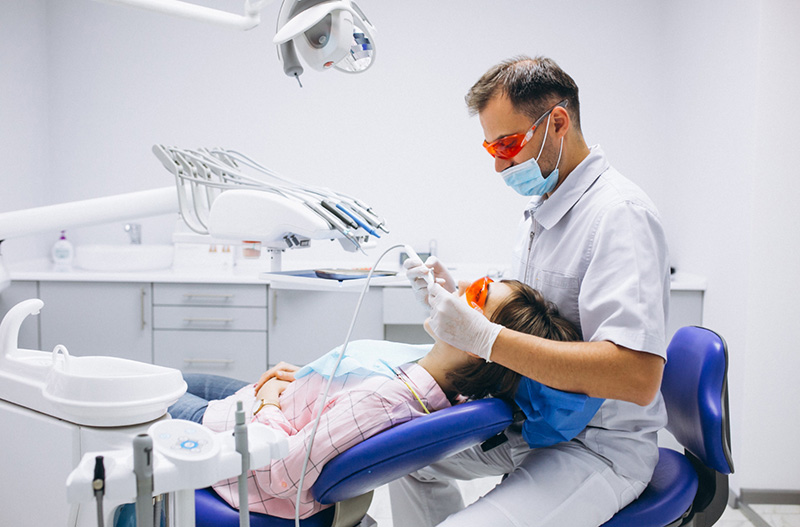
According to the CDC, 47% of American adults over 30 struggle with gum disease. That number jumps to 70% of adults over age 65. It may be the most common diagnosis made at a dental checkup.
In its early stages, gum disease (gingivitis) makes gums swell with inflammation, which can hurt and cause bleeding. As it worsens, patients can lose their teeth. Most urgently, gum disease can expose patients to serious infections that damage the bones, lungs, and even the heart.
Fortunately, there are preventative measures and treatments—including deep cleaning. It's wise to talk to your local dentist in Coquitlam, BC, to learn what treatment options are right for you.
That said, there are some broad guidelines to explore if you're wondering, "When does gum disease require deep cleaning?" Read on to learn about the stages of gum disease, and how deep cleaning works to help.
Gum disease starts with oral bacteria. Ideally, you'll be able to prevent gum disease before it ever happens. Oral hygiene is key to prevention.
That said, it's important to intervene as early as possible if you have it.
The best preventative measures are to brush and floss your teeth at least twice a day, and to see a dentist once or twice each year. It's wise to see a dentist more often if you're at higher risk of gum disease. Medications that cause dry mouth, hormonal treatments, and stress can elevate your risk.
If your risk is high, you can use mouthwash in addition to brushing and flossing.
Studies have demonstrated certain mouthwashes can further decrease the risk of gum disease. These can also help treat gum disease by reducing its severity. According to one recent analysis, the most effective mouthwashes typically include one or more of these ingredients:
Other studies have demonstrated the efficacy of Aloe vera as a mouthwash ingredient. It can improve dental health and soothe irritated tissue at the same time.
If you have early-stage gum disease, or your disease's severity is mild to moderate, a deep cleaning is the right treatment. Deep cleaning is scaling and root planing. Typically, dentists use local anesthetics, like novocaine, so the treatment is painless.
During a deep cleaning, the dentist uses manual and electric tools to remove the plaque from teeth. The process specifically removes plaque deposits that form in deep pockets of the gums. The deposits are the primary source of the germs that cause gum disease.
Deep cleaning pulls the gums from the roots of the teeth. After deep cleaning, the dentist will smooth out the roots, which encourages the gums to re-attach to the roots.
Dentists may prescribe an aftercare regimen after the deep cleaning is complete. This can involve prescription-strength toothpaste and mouthwash. You may be asked to avoid certain foods.
Once gum disease has progressed and become severe, a deep cleaning may not be enough. At this stage, you may have already lost teeth and experience severe pain. A dentist will generally prescribe oral antibiotics to get the bacterial infection under control.
Once antibiotics start working, it's possible deep cleaning is still an option. But, more often, clinicians must address severe gum disease with debridement.
In some cases, debridement cannot be safely performed in a dentist office. This is an oral surgery that removes damaged or diseased tissue.
Dentists treat the most serious cases with gingivectomy or gingivoplasty surgeries. This removes diseased gum tissue and shapes healthy gum tissue.
Catch gum disease early with a dentist you trust. Get your next dental checkup right here, from a dentist in Coquitlam. Book an appointment by phone, or contact us online today.
Tuesday, March 1st, 2022
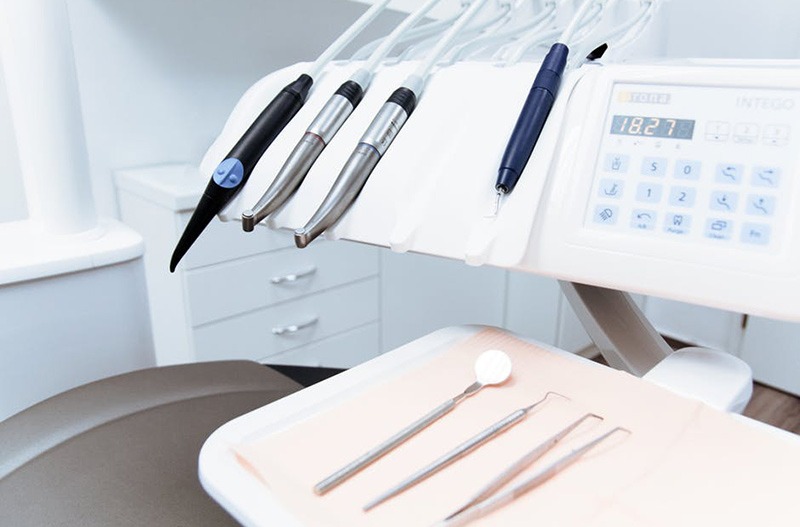
Have you ever experienced a dental infection?
Dental infections, or dental abscesses, arise when a tooth is exposed to bacteria. Even simple cavities can result in dental abscesses when they're left untreated.
We're here to talk about dental infections and how a trip to your local dentist in Coquitlam can help you prevent them. Read on to learn more.
Why Are Dental Infections So Dangerous?
Dental infections don't only affect your teeth and gums.
While infections start in the mouth, they're quick to spread. Your infection can spread throughout your body and even to your brain (after all, your mouth and your brain aren't that far apart).
Dental infections don't have to be serious to cause those problems. Even a bad untreated cavity or a crack in a tooth can lead to a dental disaster.
Aside from the obvious pain that comes alongside a dental infection, there are several health problems that can arise if you don't get treatment from your local dentist.
A tooth infection can turn into a jaw infection which is harder to treat. You'll notice significant swelling and pain. Tooth infections can also turn into sinus irritation.
In more serious cases, a tooth infection could trigger Ludwig's Angina. This can cause your neck and throat to swell, which will make it harder to breathe, speak, and eat.
In the most serious cases, an untreated dental abscess could lead to meningitis.
So how can you know if you have a dental abscess? What are the dental infection symptoms that you should look out for?
First, keep in mind that infections don't always cause pain, at least not right away. If you've had a root canal, or if you have a dental implant infection, you may not feel it because your nerve is dead.
In most cases, you'll experience at least some discomfort and inflammation. Most of the time patients will experience pain, and that pain will increase with pressure or hot and cold temperatures.
It's common to feel ill when you have a dental abscess and you may have a fever.
People with dental infections often have bad breath and they may find it difficult to open their mouths, eat, and sleep.
Although problems can arise after dental emergencies (like cracked teeth), most dental infections can be avoided if you regularly visit your dentist.
One in four adults has at least one untreated cavity. While a cavity is "no big deal" when it first forms, it can turn into a dental abscess if it's allowed to grow.
When you visit your local dentist, they'll be able to identify problems before they get serious.
When you're not at the dentist's office, make sure that you're taking good care of your own dental hygiene. Brush your teeth twice per day with high-fluoride toothpaste, floss at least once per day, and make sure to replace your toothbrush every few months.
Dental infections are no joke! If you think that you might have a dental infection, or if it's been a while since your last appointment, it might be time to visit your dentist in Coquitlam.
At Brookmere Dental Group, we're here for all of your dental needs. Contact us to set up an appointment today.
Tuesday, February 1st, 2022
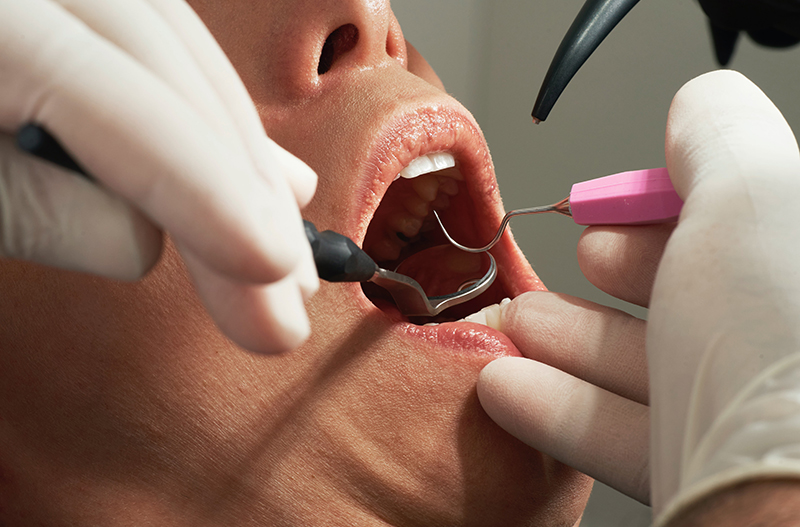
4 Ways to Treat Tooth Decay and Keep Your Tooth
There are ways to treat a decaying tooth that do not require extraction. Many people are so frightened at the thought of visiting the dentist that they will let salvageable teeth reach the point of no return. There are extraction alternatives that you might want to consider if you are worried about decaying teeth.
Filling a decaying tooth is one of the easiest dental fixes. A tooth with relatively minimal decay can be treated by filing off the decayed area and putting a filler material, usually porcelain, to fill the area where the decaying tooth was. This will help to prevent an exposed nerve and allow eating to be as normal as it was pre-decay, pre-filling with a healthy tooth.
A crown, sometimes called a cap, for your tooth is a protective covering that fits over your damaged tooth. If a tooth is too decayed to save cosmetically, or if too much decay needs to be filed down, a crown can be placed over the tooth. While often cosmetic, a crown also offers a safeguard against the pain of cold or hot on an exposed tooth nerve.
A relatively new treatment for children with the potential for decaying baby teeth is to crown the teeth instead of filling the cavities or extracting teeth. Some tooth decay is genetic, and no amount of early dental care will preclude decay in your child's first set of teeth. Crowns are a way to allow your child to keep their baby teeth so their jaw and bite will stay in alignment until their second teeth come in.
Bridges provide an extraction alternative when you have one or more missing teeth. You can save surrounding teeth by affixing a molded dental piece to the side teeth going across the area of a missing tooth or teeth. A bridge is professionally formed to look just like your own teeth, and you will be able to smile and eat as if all of your natural teeth are in place.
Root canals are a way to treat tooth decay by treating the bad tooth without extraction. Your dentist will usually give you a local anesthetic, which will numb your mouth. You will probably feel them working but the procedure should be painless after the pricks of the numbing shots. The total root canal process usually ends with a temporary filling to prevent infection where the dentist drilled your tooth. At a later appointment, a permanent crown will be placed.
For tooth extraction alternatives in Coquitlam, call us today at Brookmere Dental Group to make an appointment to see our gentle, friendly dentist. There are alternatives to pulling your tooth.
